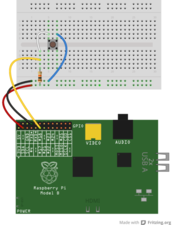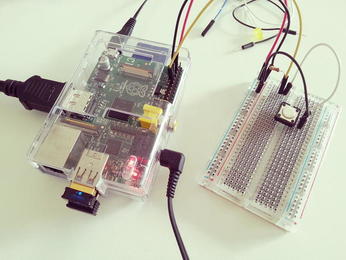Language Drills with Raspberry Pi

Productivity Sauce
After a long pause, I'm back to my favorite pastime: learning foreign languages. But this time, I've enlisted Raspberry Pi as a little language learning tool. Currently, I'm using an audio language course, and Raspberry Pi helps me memorize the words and phrases I learn. The way this works is very simple. I chop each audio lesson into sentences and phrases using Audacity and save them as MP3 files in a separate directory. Raspberry Pi is hooked to a breadboard with a push button and a resistor as shown on the diagram.
When I push the button, a Python script picks a random mp3 file and plays it. The script is rather simple, and it uses the mpg321 player to play mp3 files.
#!/usr/bin/env python
from time import sleep
import os, random
import RPi.GPIO as GPIO
GPIO.setmode(GPIO.BCM)
GPIO.setup(17, GPIO.IN)
while True:
if (GPIO.input(17) == False ):
randomfile = random.choice(os.listdir("./mp3"))
print randomfile
os.system('mpg321 ./mp3/'+ randomfile +' &')
sleep(0.1);The script requires several packages which can be installed using the sudo apt-get install python-dev python-rpi.gpio mpg321 command.
This is just a very rough prototype, and there are a lot of things that can be improved and tweaked. For example, I'm thinking about using an LDR (light-dependent resistor) to play a random file when light hits it. This way, I can place Raspberry Pi into a fridge, so it plays random files every time I open the door. Another possibility is to hook up a dot-matrix LCD screen and make Raspberry Pi display random words and phrases. Honestly, with so many ideas, I'm not sure whether I have time to learn Japanese.
comments powered by DisqusSubscribe to our Linux Newsletters
Find Linux and Open Source Jobs
Subscribe to our ADMIN Newsletters
Support Our Work
Linux Magazine content is made possible with support from readers like you. Please consider contributing when you’ve found an article to be beneficial.

News
-
Introducing matrixOS, an Immutable Gentoo-Based Linux Distro
It was only a matter of time before a developer decided one of the most challenging Linux distributions needed to be immutable.
-
Chaos Comes to KDE in KaOS
KaOS devs are making a major change to the distribution, and it all comes down to one system.
-
New Linux Botnet Discovered
The SSHStalker botnet uses IRC C2 to control systems via legacy Linux kernel exploits.
-
The Next Linux Kernel Turns 7.0
Linus Torvalds has announced that after Linux kernel 6.19, we'll finally reach the 7.0 iteration stage.
-
Linux From Scratch Drops SysVinit Support
LFS will no longer support SysVinit.
-
LibreOffice 26.2 Now Available
With new features, improvements, and bug fixes, LibreOffice 26.2 delivers a modern, polished office suite without compromise.
-
Linux Kernel Project Releases Project Continuity Document
What happens to Linux when there's no Linus? It's a question many of us have asked over the years, and it seems it's also on the minds of the Linux kernel project.
-
Mecha Systems Introduces Linux Handheld
Mecha Systems has revealed its Mecha Comet, a new handheld computer powered by – you guessed it – Linux.
-
MX Linux 25.1 Features Dual Init System ISO
The latest release of MX Linux caters to lovers of two different init systems and even offers instructions on how to transition.
-
Photoshop on Linux?
A developer has patched Wine so that it'll run specific versions of Photoshop that depend on Adobe Creative Cloud.


